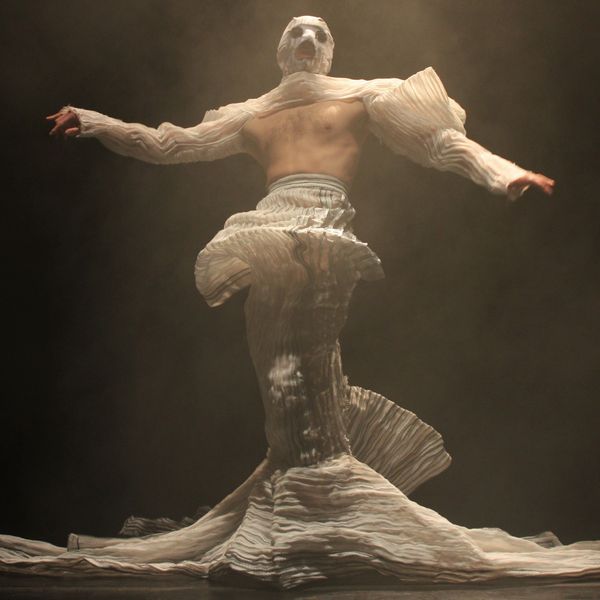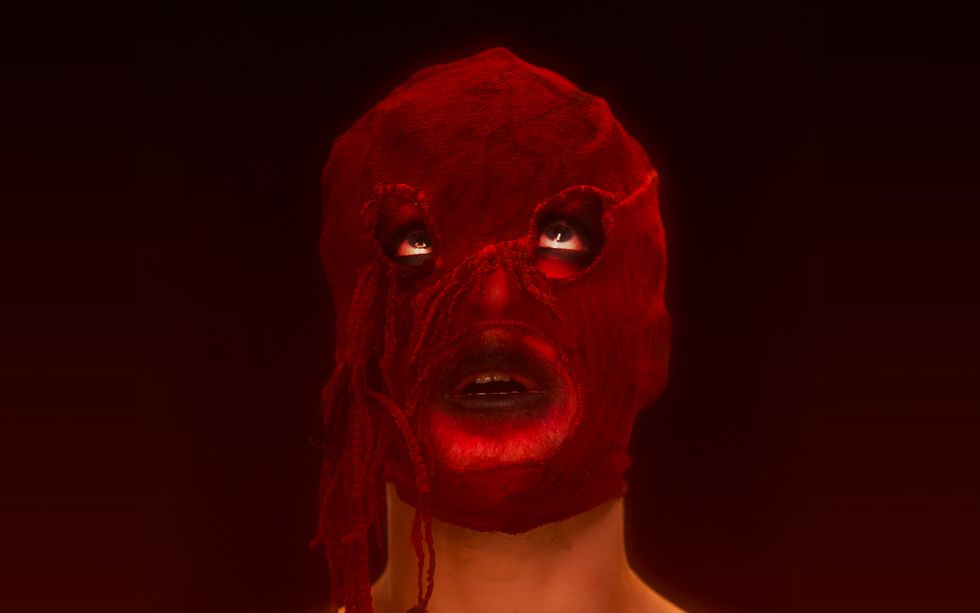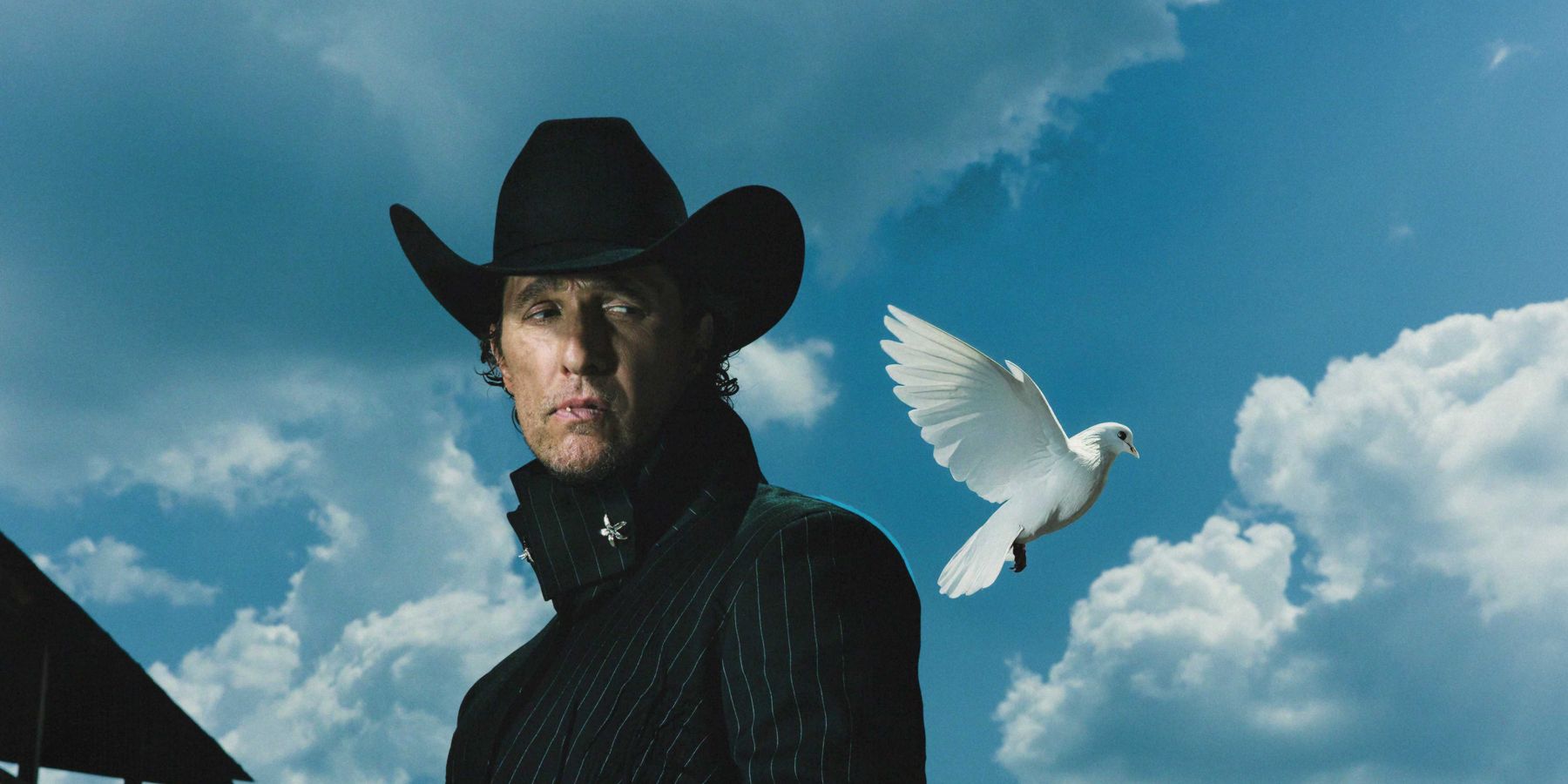
LYNKS Isn't Afraid To Be an 'Abomination'
By Tobias Hess
Apr 15, 2024Don’t get LYNKS started on Heartstoppers, Netflix’s British teen soap opera that depicts gay adolescence in dreamily utopian hues. “It sets us up for failure. It makes people expect that gay people have no problems,” the masked British provocateur tells PAPER over Zoom from Los Angeles. “[Then] people meet gay people in real life, and they're like, ‘You're not like Tan France!’”
Later in our conversation they question the political utility of their mode of queer art-making; they are, after all, a gimp mask-wearing, filthy-mouthed drag entertainer and pop performer, and there’s a risk, if not a thrill, that comes with that approach. “Oh, yeah, I'm sure a gimp mask-wearing musician talking about anal sex is really going to help poor trans people,” they offer sarcastically before pausing to recalibrate. “But I guess there's an argument to be made for visibility and how we’re showing how amazing queer people are. Maybe there's something about showing a more vulnerable side... Maybe it’s a bit harder to hate someone like me when I spend most of my music talking about how much I hate myself.”
That mix of self-deprecation, grandeur and hedonism is what makes LYNKS tick and what has fueled their ascent in the UK club scene. They combine an iconoclastic, Leigh Bowery-inspired aesthetic with a sound that merges the chaos of M.I.A. and Peaches, with the dance-y deadpan of LCD Soundsystem. That electrifying energy is always underscored by their smart and observant lyrics, which take a magnifying glass to queer culture. LYNKS is your friend on a bender, who you catch at the club in blurry glimpses of hedonism. But they are also your friend with a Letterboxd account, well known for posting a novel’s worth of critique on mainstream culture’s latest attempt at “queer representation.”
This mix of sex and smarts comes together in LYNKS’s provocatively titled debut album, Abomination, out now via Heavenly. Standout singles “USE IT OR LOSE IT”, a wryly cerebral tango that dances around the ticking clock of youth, and “NEW BOOYFRIEND”, a percussive anti-mating call, already provided listeners a glimpse into the mad mind of LYNKS. But the whole album is a surprising listen: it’s as tender as it is brash. There is a dark pleasure in being deemed abominable, but there is also, of course, a loneliness and isolation too. And here, LYNKS explores the scope of that feeling in all of its devastating and joyous glory.
LYNKS caught up with PAPER a few weeks before their debut album’s release to chat about the algorithm, queer representation and the struggles of a pop star.
I know it’s early in LA. How’s it been there, in the belly of the beast?
It's been fun, but I haven't had a single moment to do anything. We're basically shooting loads of social media content. It makes me cringe saying it, but we had the budget left for one video. So we were like, Okay, rather than spending on a video that's realistically going to have a certain amount of reach, why don't we just make like a ton of really amazing little vignettes?
Yeah, I hear you on the idea that focusing on social media can make you cringe. But I imagine you're the type of artist who enjoys the whole pomp and circumstance of promotion too?
I mean, I absolutely hate social media. It's my least favorite thing in the world. I think it's the devil. Don't tell them that, because obviously you don't want to get shadow-banned, but I know that it's the main way you can get traction these days, so you have to adapt to it. And there's something fun about the game, like grabbing someone's attention. There's definitely a kind of fucked up mathematical art to it, which is quite exciting to me. But I also hate how you're at the mercy of an algorithm that can decide if you’re worth watching at any moment.
Totally. How do you balance that game with making art that feels pure? Do you hear that algorithm in the back of your mind when you're putting things together?
As soon as I find myself making a decision purely based on social media success and it's at the expense of something that I actually like, I'm like, Okay, that's going too far. People say, “Don't read the comments because you’ll see the bad ones.” I think there’s a real argument like, Don't read them because of the good ones as well. If you find that people respond positively to a certain thing you're doing, you'll just start wanting to do that over and over again. That gets in the way of you connecting with what you actually like and pushes you to start thinking about what everyone else likes. And then making stuff becomes really sad.
Totally, that makes perfect sense. I can tell that this album felt fun for you. It's really fresh. It's really energetic. It's titled Abomination, which, for most queer people, evokes the Bible. Did you grow up religious?
No, I didn't. Thank fuck I have very atheist parents, which obviously simplifies things for a queer person They’re very accepting of queerness, and are very hippie actually, which checks out with what I do for a living. But whether or not you have a religious upbringing, religion is so baked into Western culture that you just absorb that shit. I think everyone asks, What if God does exist? And then you look up what God says about you, and you're like, Oh, fuck! I remember Googling what the Bible says about [queer people] and seeing, “A man shall not lie with another man as he lies with a woman for that is an abomination.” I was thinking about that word and the amount of damage and lives that have been ruined by that one word written in that book. I was thinking about how different the course of history would have gone for queer people if a different word was used. So I was thinking about the power of that word, and I was thinking about the destructive power of it and reclaiming it the same way queer people have reclaimed slurs. Wouldn't it be cool to reclaim abomination as a badge of honor and strip it of its bite a little bit?
The record has a certain resonance because it's coming out in this moment of anti-trans and anti-queer panic that's being felt all over the world, but is really noticeable in the UK, at least from an outside perspective.
I'm not trying to make a political message with my music at all. But just by being a queer person talking about my experience very candidly, it kind of instantly becomes political. It’s such a pivotal time. I don't even know if my music would even help. “Oh, yeah, I'm sure a gimp mask-wearing musician talking about anal sex is really going to help poor trans people.” But I guess there's an argument to be made for visibility and how we’re showing this fabulosity and grandeur, and how amazing queer people are. And maybe there's something about showing a more vulnerable side that helps humanize things a little bit. Maybe it’s a bit harder to hate someone like me when I spend most of my music talking about how much I hate myself. That's a joke. I actually like myself very much. I think I'm great, but my music is very self-deprecating in a way that is a little bit disarming for a homophobe. It’s like, “You suck.” And I'm like, I know, I've literally written a whole song about it.
I see what you’re saying about the dangers of making music that is brash and shocking to the homophobic mindset. But there's such a danger in trying to appeal to them outright, like Queer Eye, to use a random example.
Oh, God! Don't get me started on Heartstopper. It sets us up for failure. It makes people expect that gay people have no problems and that we're these 2-dimensional characters. People meet gay people in real life, and they're like, “You're not like Tan France!” You can only succeed if you suppress all anger and all your rough edges. We spent years having to file down the edges of ourselves.
Does your visual style and wearing this mask play into that idea about not filing down your rougher edges?
It wasn't a conscious decision. I've always been very excited by club kid aesthetics. Well, not always. I wasn't 3 years old looking at a Leigh Bowery coloring book, but as soon as I got into drag, I always loved that very queer, gender-fuck aesthetic. [And with my music], the whole idea was, Wouldn't it be amazing if you went into a club and Leigh Bowery was on stage making really banging dance music? And then, I just started doing it.
Was part of the idea with the mask and your aesthetic to consciously hide your everyday identity?
Yeah, for sure. People receive music in a very gendered way. Even if you replace the vocal in a song with a robotic voice, [people still feel like they’re] able to tell what's a female voice or a male voice, and similarly with their perception of clothes and visuals. We're so limited by the way the world perceives us, which is a funny thing to say as a white male presenting artist, but even so, there's a rigidity to masculinity that really limits what male artists are able to do. You see it with Sam Smith, who obviously is non-binary, but is perceived as male by a lot of people. When they do things that are more gender-fuck or fluid, it gets met by this collective cultural cringe, which shouldn't be the case. Sam Smith doesn’t make my type of music, but I think it’s objectively good, and yet, there's so much hate for it by straight people and queer people alike. Once I've masked myself, I become a blank canvas, and I can really put anything on top. It allows me to broaden the scope of what I'm able to do as a male presenting artist.
Yeah, I think pop culture and queer men can be particularly harsh on queer masc-presenting artists. I think a lot of gay men want to worship pop divas and when we “see ourselves on screen,” it's like, “Ew! Turn that off!”
I think a lot of gay men feel very aligned with the feminine. And maybe internally we feel quite feminine, so seeing someone that's unapologetically feminine and strong is incredibly affirming. That's why diva worship is such a thing. We also have been so conditioned to not present like that ourselves, so when we see an artist doing that, it's like a secondhand embarrassment. You almost imagine yourself doing that, and you’re like, “No, no, no, you're doing that thing we're not meant to do! Stop it!” And that's where that cringe feeling comes from. I think it's tied into other stuff also. Like with Sam Smith, there's a huge amount of sizeism that's going on there. Someone like Troye Sivan who’s a socially acceptable, rake-thin twink is able to get away with doing more. There’s that idea that you can have one thing that departs from the norm to still be acceptable. So when you're looking at models, you can have perfect hourglass proportions and be plus-size, but you can't have a model that's plus-size and doesn't have perfect body proportions. I think that maybe applies to gay men. Sam Smith is not only non-binary and queer, but is also plus-size. Imagine that black, latex outfit being worn on the runway by a skinny, queer artist. I think no one would give a fuck.

One of the things that stood out to me about the record and your work is its critique of queer culture in particular. And a theme throughout the record is a critique of a certain queer hookup culture. How did your thoughts and feelings on that morph on this record?
It's never the intention to write a thesis on queerness, but my best stuff is looking at what I'm feeling at any one time and putting it into words. I wrote “USE IT OR LOSE IT” when I was 25 and I looked online and I found out that was supposedly the most scientifically attractive age I was ever going to be. I was having almost no sex and I was like, “What the fuck? Is this as good as it's gonna get?” Queer people don’t have our teens to experiment and in Uni maybe it's harder to find people to sleep with. It creates this feeling of time slipping away, and soon we're gonna be old and unfuckable and we will have not taken advantage of our youth. That was just what was going through my head and I wanted to put it into a song because I hadn't really heard it done before, and that’s always my best stuff: when it’s something new. We don't need any more love songs. We’ve got enough.
Has your relationship to sex and dating and love changed since you started performing?
When I started LYNKS, I wasn't fully comfortable in my own skin as a queer person. I had all that classic internalized homophobia. A lot of us believe that if we act too gay or let the lid flip a little bit, everyone's gonna realize who we actually are and hate us. When I started performing as LYNKS, it allowed whatever was underneath to emerge. When I was dressed as LYNKS and performing on stage, it was probably the only time that I was unfiltered. The only reason I felt comfortable doing that was because I was masked. I felt like, Well, if everyone hates me for doing this, who cares? I'm a demon creature. I can take the mask off backstage, and they won't even know that's me. But I found that not only did people not hate me, they reacted more positively to this version of me than they ever had in my life. It was this feeling of, Oh, shit. This version of myself that I've been keeping hidden away is actually the true and better version of myself. Slowly that seeped into my everyday life to a point that now I don't think LYNKS and I are particularly different. LYNKS is a bit louder and a bit more theatrical, of course, but there’s not really a divide anymore. And there very much was at the start. So I can't pinpoint the moment that happened. But it's been a kind of gradual shift. I don't see myself as someone who is filtering myself that much anymore, which is amazing.Photography: Mars Washington, El Dodds, Poppy Tingay
From Your Site Articles
Related Articles Around the Web
MORE ON PAPER
ICONOS: Pepe Aguilar, El Oficio del Tiempo, la Voz del Silencio y el Peso del Legado
Español
Jan 19, 2026
Entertainment
Cynthia Erivo in Full Bloom
Photography by David LaChapelle / Story by Joan Summers / Styling by Jason Bolden / Makeup by Joanna Simkim / Nails by Shea Osei
Photography by David LaChapelle / Story by Joan Summers / Styling by Jason Bolden / Makeup by Joanna Simkim / Nails by Shea Osei
01 December
Entertainment
Rami Malek Is Certifiably Unserious
Story by Joan Summers / Photography by Adam Powell
Story by Joan Summers / Photography by Adam Powell
14 November
Music
Janelle Monáe, HalloQueen
Story by Ivan Guzman / Photography by Pol Kurucz/ Styling by Alexandra Mandelkorn/ Hair by Nikki Nelms/ Makeup by Sasha Glasser/ Nails by Juan Alvear/ Set design by Krystall Schott
Story by Ivan Guzman / Photography by Pol Kurucz/ Styling by Alexandra Mandelkorn/ Hair by Nikki Nelms/ Makeup by Sasha Glasser/ Nails by Juan Alvear/ Set design by Krystall Schott
27 October
Music
You Don’t Move Cardi B
Story by Erica Campbell / Photography by Jora Frantzis / Styling by Kollin Carter/ Hair by Tokyo Stylez/ Makeup by Erika LaPearl/ Nails by Coca Nguyen/ Set design by Allegra Peyton
Story by Erica Campbell / Photography by Jora Frantzis / Styling by Kollin Carter/ Hair by Tokyo Stylez/ Makeup by Erika LaPearl/ Nails by Coca Nguyen/ Set design by Allegra Peyton
14 October
Entertainment
Matthew McConaughey Found His Rhythm
Story by Joan Summers / Photography by Greg Swales / Styling by Angelina Cantu / Grooming by Kara Yoshimoto Bua
Story by Joan Summers / Photography by Greg Swales / Styling by Angelina Cantu / Grooming by Kara Yoshimoto Bua
30 September




